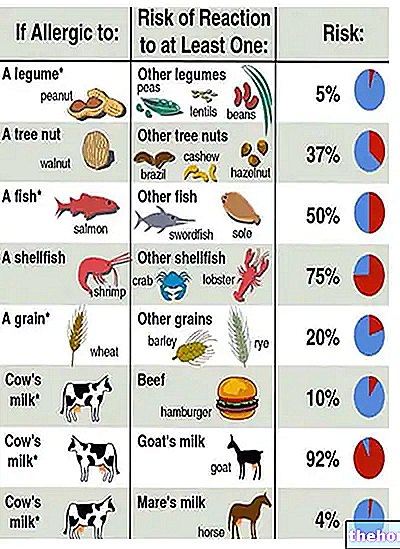What are Crustaceans
They are crustaceans: prawns and shrimps, prawns, prawns, crabs, lobsters, cicadas, lobsters, mantis shrimp, crabs, spider crabs, crabs, moeche of all kinds, etc.

Crustaceans are considered valuable and very tasty foods; despite having a high cost, thanks to their palatability, they are among the most commercialized fish foods in the world.
From a nutritional point of view, crustaceans are classified in the I fundamental group of foods. They have a moderate energy intake, contain high biological value proteins, B vitamins and mineral macro-elements (calcium, phosphorus, sodium, etc.). They are also rich in astaxanthin (antioxidant provitamin A), cholesterol, essential omega 3 fats (eicosapentaenoic and docosahexaenoic acids) and important mineral trace elements such as iodine, zinc and selenium.
Although nourishing, crustaceans have a very high allergenic power; that is why, like shellfish, they should be excluded from children's diets and replaced with hypoallergenic fish such as cod.
What is shellfish allergy?
By allergy we mean an immune-mediated adverse reaction (release of certain immunoglobulins) against one or more well-defined peptide sequences. In the case of food allergies, the symptoms (more or less severe) appear after the ingestion of foods that contain these amino acid sequences; depending on the case, these symptoms can arise almost immediately or after many hours (following the digestion of food towards you are allergic to).
Shellfish allergy is one of the most common, frequent and widespread allergies in the world. It is also one of the most dangerous and holds the absolute record for hospital admissions. It appears more often in adulthood than in the juvenile phase.
Allergy to shellfish is NOT synonymous with allergy to fish and shellfish. Those who suffer from allergic reactions to shellfish can, in theory, easily eat fish "properly so called" (those with bones, so to speak, such as sea bream, anchovies, tuna, etc.), cuttlefish, octopus, squid, squid, baby octopus, snails sea and land, mussels, clams, cockles, cockles, oysters, scallops, scallops, sea truffles, razor clams, etc. On the other hand, before expanding their food choices to these solutions, the shellfish allergic should consult an allergist and follow a very specific diagnostic procedure.
Note: even if statistically the shellfish allergy is more often definitive, it is not possible to know for sure. This depends very much on the case and there are no known methods to identify the time of permanence.























-nelle-carni-di-maiale.jpg)




